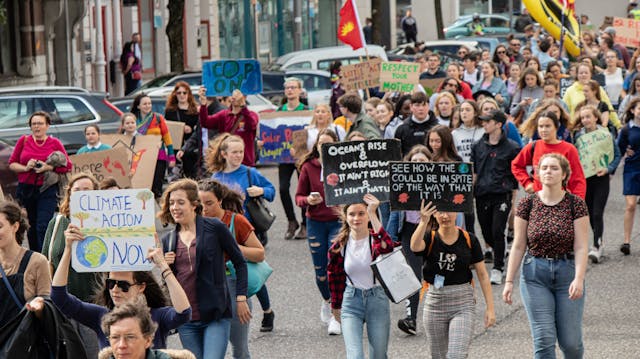Climate Change and Politics: How Governments Are Responding to the Environmental Crisis
Climate change is one of the most pressing issues of our time, impacting ecosystems, economies, and communities worldwide. As the effects of global warming become more evident, the role of governments in addressing this crisis has never been more critical. While the scientific consensus on the urgency of climate action is clear, political responses vary significantly from country to country, influenced by factors such as economic interests, public opinion, and international relations. This article explores how different governments are responding to the environmental crisis, the political challenges involved, and the potential solutions that are being considered.

The Global Political Divide: Different Approaches to Climate Change
Governments around the world are taking varying approaches to climate change based on their unique political, economic, and environmental contexts. While some countries have been at the forefront of climate action, others have been slower to implement significant measures, often due to political, economic, or social factors.
Leading Countries in Climate Action
Several countries have made significant strides in combating climate change by enacting policies that promote renewable energy, reduce emissions, and prepare for the long-term impacts of global warming.
European Union (EU)
The European Union has been a leader in the global effort to combat climate change, setting ambitious targets and adopting wide-reaching policies. In December 2019, the EU introduced the European Green Deal, aiming to make Europe the first climate-neutral continent by 2050. This includes cutting emissions by at least 55% by 2030 and transitioning to a circular economy. The EU has also been a major player in international climate negotiations, such as the Paris Agreement, where it has pledged to provide financial support to developing nations in their fight against climate change.
United Kingdom
The UK has committed to reducing its carbon emissions to net-zero by 2050, making it the first major economy to pass such legislation. The UK's efforts include investing in clean energy sources, promoting electric vehicles, and phasing out coal. Additionally, the country hosted the 26th UN Climate Change Conference of the Parties (COP26) in Glasgow in 2021, where leaders discussed global climate commitments and initiatives.
Costa Rica
Costa Rica is a standout example of a smaller country making significant environmental strides. It has committed to becoming carbon-neutral by 2050, and it already generates around 99% of its electricity from renewable sources. The country’s proactive environmental policies, such as reforestation programs and a focus on ecotourism, have earned it international recognition as a climate leader.
Countries with Slower Progress
However, not all countries have embraced climate change action to the same extent. Political challenges, economic dependence on fossil fuels, and public resistance have delayed action in some regions.
United States
The United States has been a key player in the global conversation on climate change, but its approach has varied dramatically depending on the administration in power. Under President Obama, the U.S. took significant steps to address climate change, including joining the Paris Agreement and introducing policies to reduce emissions, such as the Clean Power Plan. However, under President Trump, the U.S. pulled out of the Paris Agreement, rolled back environmental protections, and emphasized energy independence through fossil fuel extraction.
Under President Biden, the U.S. has rejoined the Paris Agreement and set ambitious climate goals, including reaching net-zero emissions by 2050. Biden’s administration has also proposed a $2 trillion climate plan focused on clean energy, electric vehicles, and green infrastructure.
Australia
Australia has faced criticism for its lack of action on climate change, particularly due to its reliance on coal and natural gas. While the country has pledged to reduce emissions, the government has been hesitant to implement strong policies, largely due to its significant fossil fuel exports and political influence from the coal industry. However, public pressure and the growing impact of climate-related disasters, such as wildfires and droughts, are prompting a shift in political attitudes.
Brazil
In Brazil, President Jair Bolsonaro’s administration has been criticized for rolling back environmental protections, particularly in the Amazon rainforest, which is vital for regulating global climate patterns. Bolsonaro’s policies have encouraged deforestation, which undermines efforts to combat climate change. Despite international pressure, Brazil has struggled to implement more robust environmental protections under this leadership.
The Politics of Fossil Fuels and Economic Dependence
One of the main political challenges in addressing climate change is the economic dependence on fossil fuels in many countries. Governments in oil-rich nations or those with significant coal industries often face a difficult balancing act between fostering economic growth and meeting global climate commitments.
Countries like Saudi Arabia, Russia, and Venezuela, for example, are major oil producers and have been reluctant to commit to drastic cuts in fossil fuel consumption, as such measures could threaten their economic stability. These countries have historically downplayed the severity of climate change and have been resistant to international climate agreements that could impact their oil and gas revenues.
For many developing countries, the pressure to reduce emissions must be balanced with the need for economic growth and access to energy. Nations in Africa, Asia, and South America often face a dilemma: reducing emissions could hinder development and exacerbate poverty, while climate change poses an existential threat to their future.
Political Challenges in Climate Policy Implementation
Even in countries where political will exists to address climate change, the implementation of effective policies is not always straightforward. Some of the main political challenges include:
Public Opinion and Political Will
Public opinion plays a significant role in shaping climate policies. In many countries, the costs of transitioning to a green economy—such as the potential for job losses in industries like coal mining and oil extraction—create resistance among certain political constituencies. Governments may be reluctant to push forward with policies that could alienate voters or disrupt the economy, even if those policies are crucial for long-term climate stability.
Corporate Influence and Lobbying
The influence of powerful industries, particularly fossil fuel companies, on political decision-making can delay or weaken climate policies. Lobbying by corporate interests has often been successful in shaping policy to favor short-term economic gains over long-term environmental protection. In some countries, political leaders are hesitant to challenge these industries due to financial contributions, job creation, or fears of economic repercussions.
International Cooperation and Geopolitical Tensions
Climate change is a global issue that requires international cooperation. However, geopolitical tensions between nations often complicate collective action. For example, the United States and China—two of the world’s largest emitters—have historically clashed on climate policy, with the U.S. pulling out of the Paris Agreement under one administration and China emphasizing its development needs over emissions reductions.
While agreements like the Paris Accord have helped to bring nations together, the challenge of ensuring global compliance and creating equitable solutions for both developed and developing countries remains a significant hurdle.

Potential Solutions and Pathways Forward
Despite these political challenges, governments can take several steps to tackle climate change effectively:
A Green New Deal
Some countries, including the United States under President Biden, have embraced the concept of a Green New Deal—a comprehensive set of policies designed to transition the economy to renewable energy, create green jobs, and reduce carbon emissions. A Green New Deal would invest in clean infrastructure, provide incentives for clean energy production, and create a just transition for workers in traditional industries.
Carbon Pricing and Emission Trading
Carbon pricing mechanisms, such as carbon taxes or cap-and-trade systems, can incentivize businesses to reduce emissions. By placing a cost on carbon emissions, governments can encourage companies to adopt cleaner technologies and shift towards greener alternatives. Countries like Canada and the EU have implemented carbon pricing, and it’s gaining traction in other regions.
Investing in Renewable Energy
Investing in renewable energy sources, such as solar, wind, and hydroelectric power, is a key strategy for reducing greenhouse gas emissions. Governments can provide subsidies and incentives for the development of clean energy infrastructure, as well as support research into new technologies that can further reduce the reliance on fossil fuels.
International Cooperation
Climate change is a global challenge that requires international cooperation. Governments can work together to share resources, knowledge, and technology to help developing countries transition to cleaner energy sources. Financial support for adaptation and mitigation efforts in vulnerable regions is also crucial for addressing global climate inequality.
Conclusion: The Future of Climate Politics
As the impacts of climate change become more pronounced, the urgency for governments to act will only increase. While political challenges and differing national interests will continue to shape climate policy, global cooperation and innovative solutions are essential for mitigating the environmental crisis. Climate change is not just an environmental issue; it is a political, economic, and social one that requires comprehensive, collaborative efforts. By prioritizing long-term sustainability over short-term interests, governments have the opportunity to lead the world towards a healthier, more resilient future.












